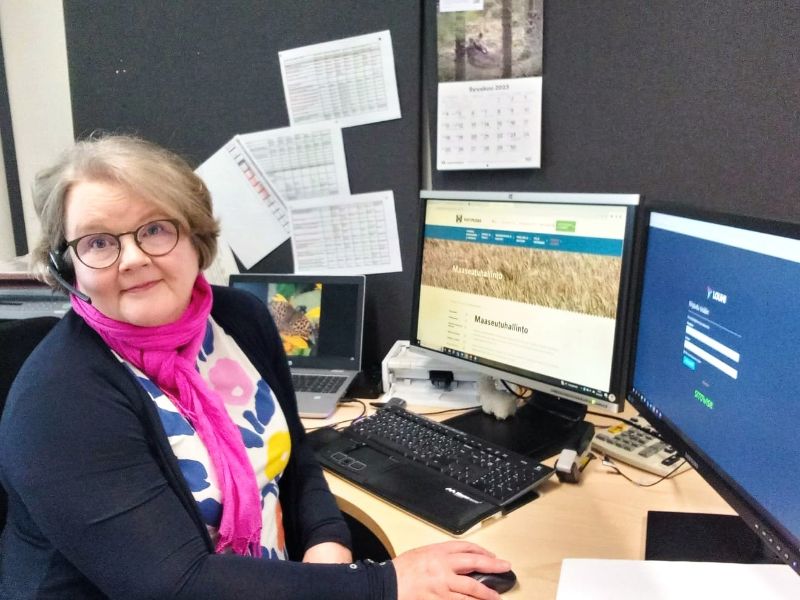Rural Secretary
"At this stage of my career, changes-of-generation and young farmers who are enthusiastic about their profession are particularly heart warming. It is wonderful to see that food will continue to be produced in Finland."

- Sinikka Linnakallio
- Rural secretary, at Pihtipudas rural administration local government collaboration area.
- Graduated as an agrologist from Ilmajoki School of Agriculture.
- Over 30 years of work experience in the field.
Briefly explain what you do for a living.
As a rural secretary, I work in the local official duties of rural administration, which are related to EU and national agricultural subsidies, animal keeper's register, game damage and wild oats act.
How have you ended up in the profession of your choice?
I wanted to work on agriculture and live in a rural area. I studied to become an agrologist, which gave me the skills to apply for this job, for example.
Describe your typical working day or week.
The work is mainly office work. The day includes customer contacts, which are handled either by telephone or e-mail, and some customer meetings. A large part of the working hours goes to the processing of subsidy applications. The application and processing of subsidies takes place electronically. Expert work also requires continuous training, which means that I now participate in short training sessions via Teams on a weekly basis, for example.
What kind of work environment or working hours do you have?
The working environment is an office of the municipal agency, and the work complies with the collective agreement for the municipal sector. Office hours are 37 hours and 15 minutes a week. Working hours can somewhat be adjusted to one's own schedule, as the work can be started in the morning between 7 and 9, and ended in the afternoon between 15 and 17. I work remotely about one day a week. Game damages and wild oats take me to the terrain a few days a year.
What kind of competence or qualities are required in the profession?
Being good at learning and applying new rules and guidelines, is an advantage in this job. They vary by programme period and partly annually, and there are a huge number of them. In customer contacts, you should know how to pick the parts that belong to the farm in question, from the complex subsidy network, and explain them so that the customer understands them. Our customers' farms and their skills and ages vary greatly, which poses challenges to how things are communicated.
What is the best thing about your profession?
Friendly customers and a great work community. The small moments when I notice that the customer has been able to find an answer to their question with my help, are important to me. At this stage of my career, changes-of-generation and young farmers who are enthusiastic about their profession are particularly heart warming. It is wonderful to see that food will continue to be produced in Finland.
What are the downsides of the profession or what seems challenging?
It is hard to see the challenges and impacts of complex EU and national regulations on the farmer's everyday life and coping, when operating here close to them.
What would you tell a person considering the profession of a rural secretary?
If you are interested in agriculture and the people working with it, but are also ready to maintain your professional skills on a continuous basis, you should consider this work as one option. Today, we have sufficient tools to work with and keep in touch with our customers. Experience and contact with agriculture in practice, is no disadvantage in this work.
How do you see the future of your profession?
During my career, the whole society has made a huge digital leap, which means that we have progressed from an ordinary typewriter to artificial intelligence to solve some of the issues for us. In the future, the processing of applications will become more automated with regard to routine matters. There are still tasks that require human consideration, as well as various reports and solutions to conflicts, i.e. there will also be work for us people in the future. I think that in the future, the work will increasingly be a mixture of placelessness and communality enabled by remote work.
